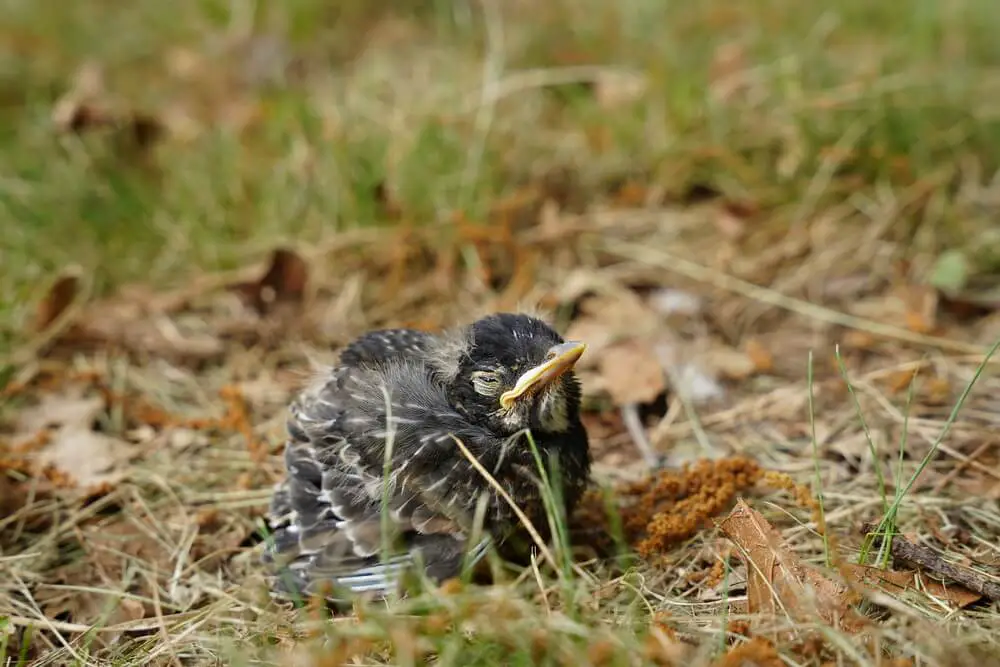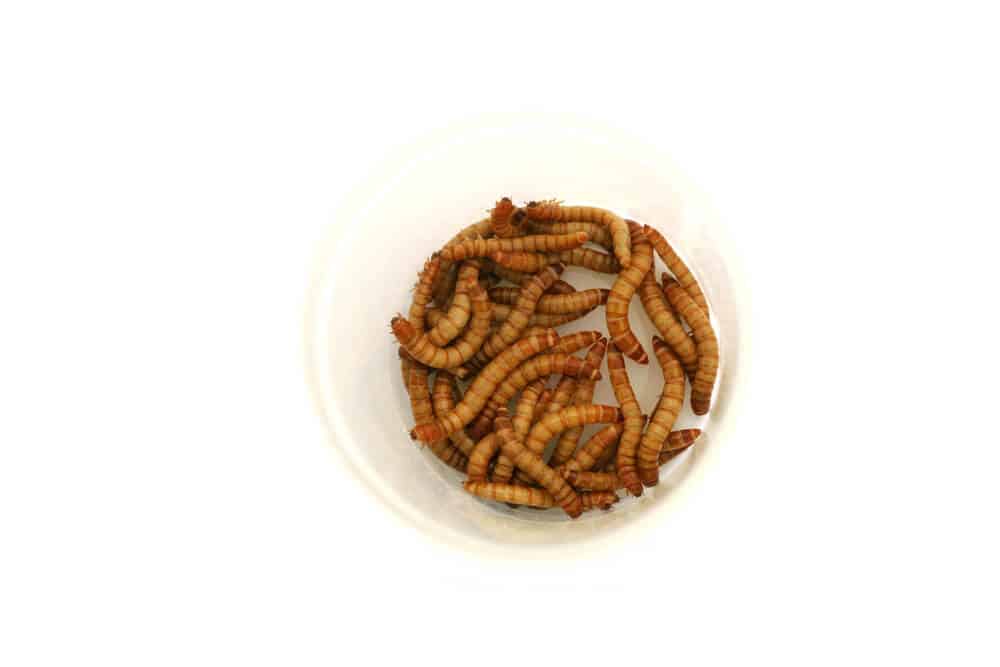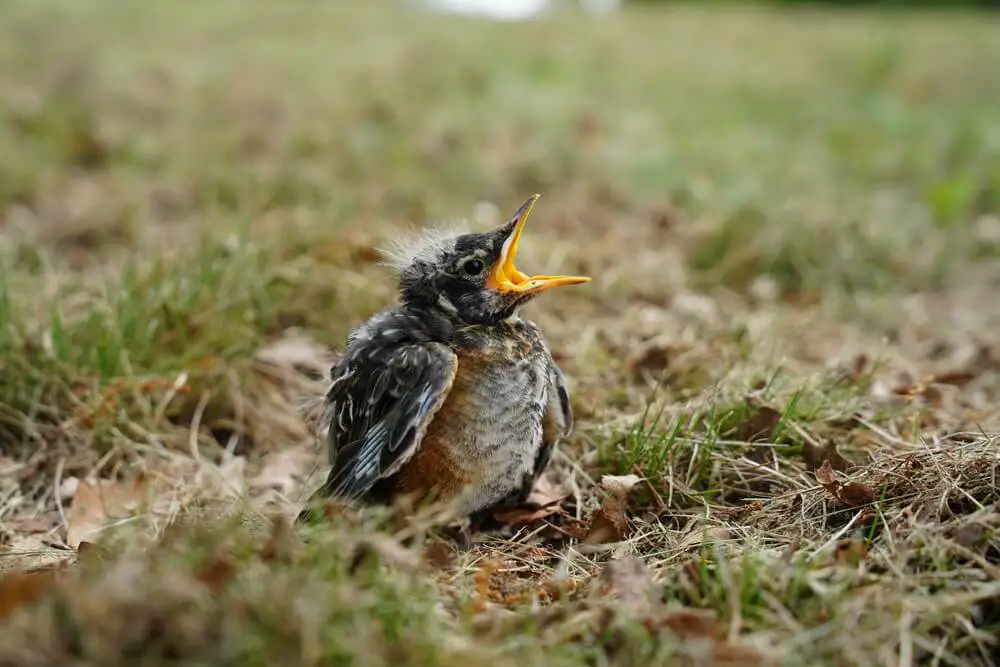Robins are beautiful, sweet and curious creatures with a strong sense of family.
So, when they grace our yards and gardens, we feel somewhat responsible for them. Such is the case when we see a baby robin heartbreakingly hungry and crying.
You know they eat worms but can baby robins eat mealworms?
Yes, they absolutely can!
Mealworms are delicious, nutritious and healthy for robins. Babies will eat mealworms heartily and you’ll see them return to your garden over and over again because they’ll know where to get the good stuff.
But, feeding a baby robin is simple in theory; there are some things you must first consider. Because they’re essentially wild, you can’t treat them like a typical family pet.
Are Mealworms Good for Baby Robins to Eat?
Mealworms are the perfect baby food for robins. They provide essential nutrients, like protein, fatty acids and fiber, which will keep them healthy while making them strong.
In fact, mealworms provide at least half of their daily recommended protein intake. Additionally, mealworms are easy for baby robins to eat, being gentle on their delicate digestive systems.
It’s a perfect balanced diet for these precious and cheeky birds.
While mealworms provide essential nutrients, it’s also crucial to understand the hydration needs of baby robins. Just like other baby birds, robins have specific water intake requirements. Find out more about the water requirement of baby birds here..
How to Feed Mealworms to Baby Robins?

Feeding mealworms to baby robins isn’t complicated. You simply spread a few out on a tray, the earth or some other general surface.
For example, you can get a ground bird feeder tray like this one from Amazon.
Avoid feeding the bird out of your hands. Doing this is risky and not advisable for the future wellbeing of the robin.
Plus, oils, grease and other elements stick to human hands and this may not sit well in the bird’s digestive tract.
If offering dried mealworms, put them in a dish with some warm water and allow them to soak for 30 minutes. This will not only provide hydration but it will also make them more portable.
When they’re fresh and large, chop them into smaller pieces.
Administering Food
Once you’ve set the food, allow the robin to eat what it wants. In the meantime, observe the bird to ensure it’s eating well and that it doesn’t look sick or injured.
In the event the bird needs medical attention, call an avian veterinarian or a licensed wildlife rehabilitator for help and advice.
If the baby robin is less than 14 days old, it can’t eat on its own and you’ll have to manually feed it.
You can use tweezers, an eyedropper or even a straw to drop the mealworms in its mouth. Whatever you use, ensure it’s not metal to reduce the chances of injuring the bird.
Always feed baby robins during the day in 15 to 20 minute increments and never more than five times in an hour. At the very least, you will have to feed it once per 30 minutes from sunrise to sunset.
What To Consider While Feeding Mealworms To Baby Robins?
Before you feed mealworms to baby robins, determine its age and if it’s an orphan or not.
Age is important because robins younger than 14 days old are not ready to be away from the nest and you must try to keep it there.
If it’s visibly older, then you can take the bird into your home or set up a home for it on your porch.
If you’ve found a baby robin near a nest, you may wonder if the parents would return to the same nest in the future. Learn more about whether robins reuse their nests or not.
To determine if it’s an orphan, wait a day or two after you find it. Pay attention to other robins and observe if the baby robin cries for a long time. If no other robins come to claim it, it’s likely an orphan.
When parents are around, you cannot feed the baby robin. They will feed it and you should not intervene. But, you can leave dried or fresh mealworms in plain view of the parents. They’ll see it and grab what’s essential.
However, if the baby robin is an orphan, you can feed it mealworms (as described in the section above).
While it’s perfectly fine for them to stay in your garden or home, you only want to feed them for a brief time. Once they become “teenagers,” allow them to find food on their own.
After you’ve cared for and fed a baby robin, you may also wonder about where a baby robin goes once it’s ready to leave the nest.
How Many Mealworms to Feed a Baby Robin?

The number of mealworms you feed a baby robin will depend on its age. If it looks newborn, then only provide about a teaspoon of mealworms for it to feast on.
If the baby robin looks older than two weeks, then provide a tablespoon of mealworms.
The most important thing to remember is to not overfeed the bird, it will be detrimental to its health, growth and development.
Pros And Cons Of Feeding Mealworms To Baby Robins
| Pros | Cons |
| Mealworms are a perfect superfood for baby robins | It’s easy for robins to become too reliant on you for food |
| Helps them build strength to keep them warm and healthy | They may end up eating the fruits and vegetables from your garden |
| Soft, nutritious and easy to digest | It’s a commitment of time and resources |
| You will save a life that might have otherwise died |
While mealworms and other insects form a core part of the robin’s diet, their feeding habits can change based on seasons. Discover what robins eat during snowy conditions, when their usual food might be scarce.
What Other Foods Can Be Given to Baby Robins?
While mealworms are ideal for baby robins, they should have a well-balanced diet that consists of various menu items. The following are things they will definitely consume:
- Earthworms
- Grubs
- Crickets
- Grasshoppers
- Beetles
- Fruits (blackberries, strawberries, mulberries, grapes and blueberries)
Final Thoughts
Baby robins are adorable and sweet, so it’s only natural to want to feed them. While mealworms are an excellent choice, you want to ensure that you aren’t intervening with the parents’ responsibilities. This means checking to see if the bird is an orphan and determining the baby robin’s age.
Start with small portions and build up the amount as it matures. Make sure you don’t overfeed it or allow it to depend on you for food.
Following these simple rules will ensure the bird grows healthy and strong while maintaining its natural development.
Caring for baby robins might spark your interest in their entire lifecycle. While you learn about their early days, it’s also fascinating to know how robins manage during the cold winter months.


